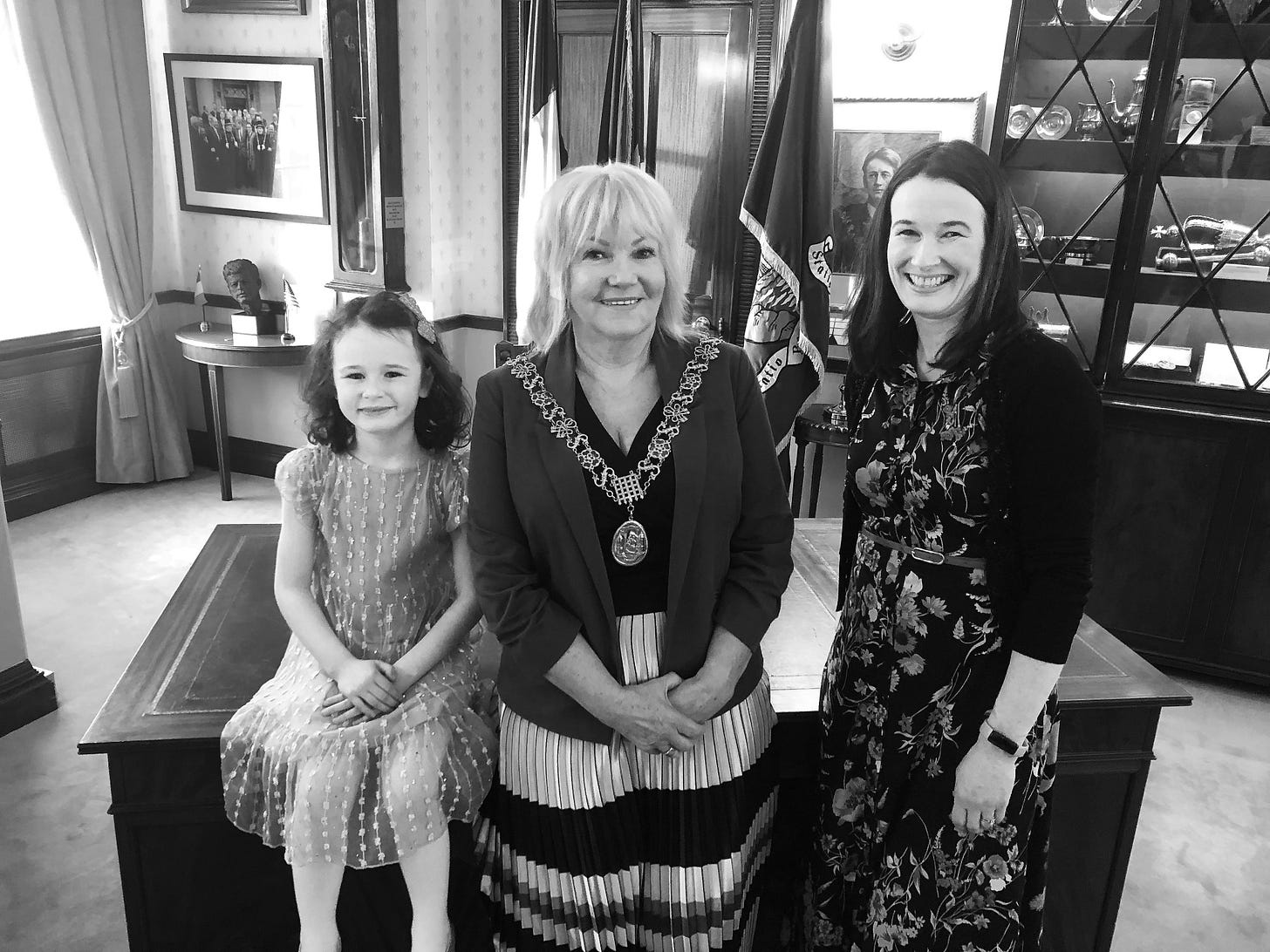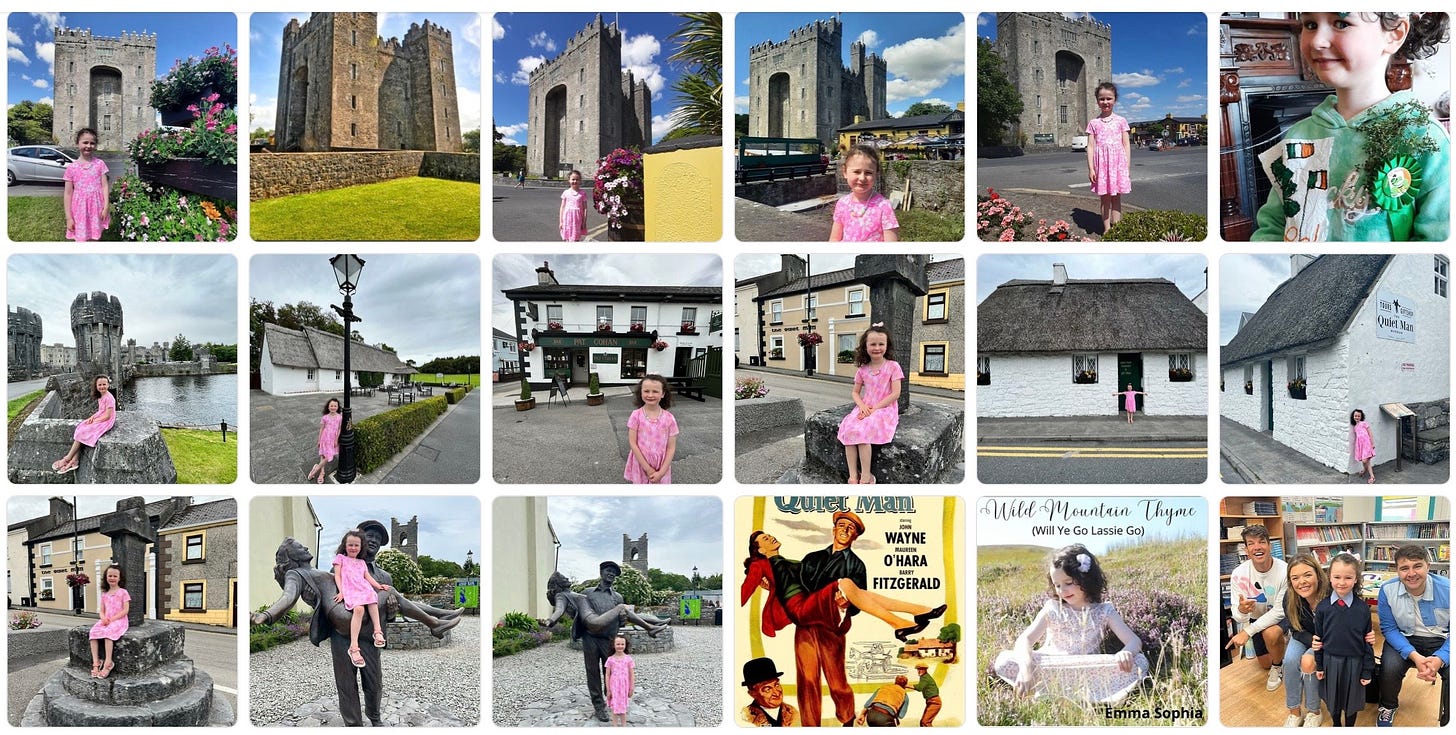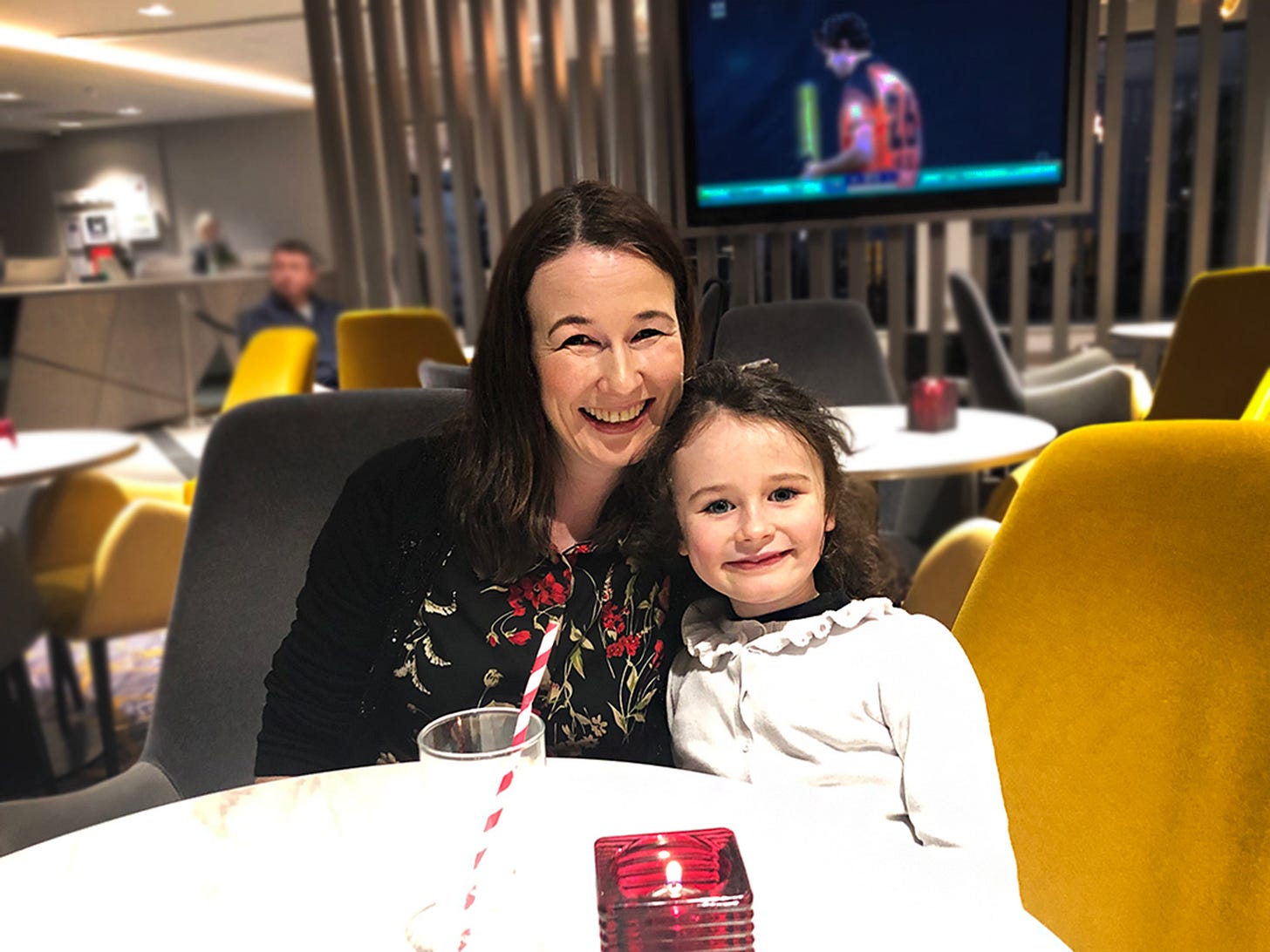Meet Kinsale's six-year-old singing sensation
Singer Emma Sophia is set for a big performance at Cork city's annual Lord Mayor's Tea Dance, but she's a seasoned veteran at this stage, having first gone viral at just four years of age.

In the Lord Mayor’s chambers in Cork City Hall, cameras are clicking at the launch of the Lord Mayor’s Tea Dance.
Emma Sophia Ryan is on hand to sing at the launch: the Kinsale senior infant is going to be one of two soloists singing at the event, the other being Charleville’s former Voice of Ireland winner Keith Hanley.
The annual Lord Mayor’s Tea Dance, started by Cork Pops Orchestra founders Gerry Kelly and Evelyn Grant and run by a community committee, has been a firm multigenerational favourite in Cork city since its earliest iteration as a millennium ball in city hall.
But it doesn’t usually feature performers who are just six years old.
Accompanied by her mother, professional violinist and pianist Mary McCague, Emma Sophia steps up to sing.
There’s a moment’s uncertainty as she gets shy right before her song. A photographer has asked if she can sing standing alongside the Lord Mayor, instead of where she was originally positioned: she pulls her mum’s sleeve, she doesn’t want to do it. There’s a brief negotiation and some cajoling, with another adult reminding Emma that she will get to choose something from her selection box after she’s finished singing.
And then, Mary plays the opening bars of The Carpenters’ Top of the World, and little Emma starts to sing, and the room falls silent, listening to her sparkling clear voice.
By the time Emma Sophia was 18 months old, she could memorise and sing full songs, Mary tells me later.
It’s after the excitement of the launch, but Emma has to stay in Cork for a piano lesson at 6.30. So we go to a cafe nearby, where she gets an apple juice with a stripy red and white straw. Emma wants to be a “singing artist” when she grows up, she says. She likes to draw things from her imagination, but from real life too.
“At 18 months she was already singing full songs, not from being taught them, but just because her speech was so developed and she’d pick them up,” Mary says. “My husband sings folk songs around the place, and he’d be singing and she would just sing a verse that she’d picked up from him.”
“She was singing Isle of Hope when she was about two and a half. Her nan and grandad live next door and they were just tickled by it, so it was kind of entertainment for them too.”
When Emma was three, Mary and her husband Fintan decided to make a video of Emma singing Ireland’s Call and share it on social media.
In April 2020, Mary and Emma started an online show called The Emma Sophia Show: billed as “The World’s Youngest Lockdown Entertainer.” Designed for kids, the show features Emma and Mary at home, doing things like dispensing tips on how to wash hands, with a new song each week too.
“We started getting messages from people all over the world and she was learning a new song every week for it and she seemed to learn them very fast,” Mary says. “We’d make little videos and we gradually got more creative and inventive with our videos.”
Mary, a professional musician who founded and manages the Munster String Quartet and tours with classical crossover trio Everdream alongside soprano Emer Barry and harpist Teresa O’Donnell, was out of work during the Covid 19 lockdowns and Emma was home from preschool: the Emma Sophia Show was as much about keeping them entertained as anything.
But really it was the following year when she was four, that a video of Emma singing Danny Boy went truly viral: “It had a million views in the first 24 hours,” Mary says with a shake of her head.
The video is currently at 3.6 million views on Emma’s Facebook page and over 550,000 views on Youtube. The appeal of the video, featuring Emma in an Aran knit jumper singing against a backdrop of distinctively Irish rugged coastline, is very much for the American diaspora.
Mary is used to tailoring her own output to the large “Celtic” market in the States, where cultural products like Riverdance and Celtic Woman are big hits with US audiences who maintain a strong emotional connection to what they often call “the old country.”
“It really resonates with them,” Mary says. “Danny Boy has people in tears. One guy commented, ‘I’m known to be a bit of a hard man but I’m in tears.’ We read the comments out to Emma. They’re nice aren’t they?” she says, turning to Emma. “You love the GIFs.”
Cottage industry
Since then, Emma’s videos have become something of a cottage industry for the family: Mary plays and records the accompaniment, while husband Fintan Ryan, whose day job is in the pharmaceutical industry, films the videos.
In fact, sometimes they quite literally involve cottages. Mary and Fintan use beautiful Irish scenery, making family outings out of recording. Before Christmas, the family headed off on an adventure to film a video of Emma singing Silent Night, which was a big hit with fans.
“For Silent Night, we went up to Clifden to film in a pre-famine cottage and we stayed over,” Mary says. “We had a nice weekend.”
“We stayed in a hotel,” Emma tells me.
What was the cottage like? “It was very dark in there.”
Fintan has invested in a drone and Mary edits the videos herself on Filmora, as well as handling the audio recordings.
But in one way, they’re not like an industry: apart from covering their costs, Mary says, the family donate any earnings from Emma’s video views on YouTube to charity.
“There was a bit came in from Danny Boy,” she says. “It’s only if a song is out of copyright that you can earn anything. We try to cover our own costs but then we gave the rest to the Laura Lynn foundation. The one she did last Patrick’s Day, we donated to St Vincent De Paul: once our costs are covered we donate the rest because we’re not doing it for money.”
Digital footprint
Emma’s Facebook and Instagram pages contain collections of photos designed to appeal to her fans: Emma at thatched cottages and Irish castles and turf fires and in the countryside, as well as updates from her regular life, her first piano exam, the loss of her front teeth.
It’s a vast digital footprint for a six-year-old to have accumulated, and most posts are written in the first person, from the perspective of Emma herself.
It’s an area where parents are becoming increasingly aware, but Mary sees the digital footprint Emma is accumulating as something positive, a sort of online CV that Emma can choose to build on if she wishes.
“Nowadays, that’s where everything is,” Mary says. “If she was 18 or 19 and decided this is what she wanted to do, it can be very hard to break into an industry if you don’t have a backstory or something and I’ve found that myself. This is something she’ll always have - when I was four I had a viral video. It’s really preparing for her future if she did want to go down that route.”
Nevertheless, the online world being what it is these days, Mary and her husband are extremely vigilant when it comes to Emma’s social media.
“We monitor everything, even down to checking the profiles of people who are liking the page,” Mary says. “My husband does a lot of that; you kind of have to. So we monitor it very carefully and I think it will stand to her in the future.”
“Her page has a lot of older people on it and it’s all very kind and supportive.”
The apple doesn’t fall far from the tree
In so many ways, besides her precocious talent, Emma is a normal little girl, with a normal little girl’s life: she has a baby brother, Declan, who is now three. She’s in senior infants in Gaelscoil Chionn tSáile. The tooth fairy has visited four times, and she’s looking forward to her front teeth growing back. “If you put your nail in, you can feel the hard bit where it’s growing,” she says, prodding at her gums.
Her own favourite song at the moment, she tells me, slurping the last of her apple juice, is When I Grow Up from Matilda the Musical. She hasn’t tried singing it, she just loves the funny video, the way a child’s daily reality is converted into an imagined adult life.
“In it, he’s driving a little baby bike and then he imagines what he’ll be like when he grows up and he’s driving a big motorcycle and going fast,” Emma says. “It’s funny.”
It’s been a long day: she had school in the morning, and then the excitement of the Lord Mayor and the launch, and now mother and daughter will stay in the city until 6.30pm when she has her piano lesson, and then they’ll drive home to Kinsale.
It seems like a lot of work for one little girl. But this is the parental conundrum when it comes to skillsets like music and sports, isn’t it?
The child won’t really start to reap the rewards of their practice until they reach a certain level of proficiency, and children aren’t in things for the long-term benefits: parents make the decisions about things like how long a child will spend on practicing an instrument.
“We’re trying to get over the scratching on the violin at the moment and that’s not pleasant, either as teacher or student,” Mary says with a laugh. “So many people give up though, and then they look back and regret it. It’s great to just keep at it, stick with things until you’re absolutely sure you don’t want to do them any more.”
Emma practices every day: violin, piano or singing. But not to excess, Mary says.
“She’s taken a few singing classes with a teacher called Maureen Ward in Kildare: we’ll just look over things and make sure she’s using her voice properly, because I’m not a singer myself. You don’t want to over develop her voice at such a young age. It’s very natural, what she’s doing. Whenever you hear a small child and they sound really operatic, I really don’t like that. If you’re talking about pushy parents, I think that can be a sign. That just can’t be natural.”
As someone who made her own national TV debut at eight, Mary is able to weigh up the demands and the benefits with her own experience to fall back on.
Mary grew up in Dundalk, where her mother was a well-known music teacher, Patricia McCague, and her dad was a fiddle player. At eight, Mary was performing a tricky Shostakovich piece on the piano on the Late Late Toy Show.
“I loved it so much that I decided that that’s what I wanted to do,” she says. “That was always my life, just in music. I remember the feeling: the waiting room, the set. The piano was white and the colour of all the toys: it was just magical. We went to the canteen and saw people you’d recognise off the TV and I had a little autograph book and was going around collecting autographs.”
“Even looking back on my own childhood, did I ever feel forced to do anything? Obviously, you’re told to go and practice. But she certainly wouldn't be doing anything that she really didn’t want to do. There are times when she’ll say that she doesn’t want to sing and I’ll say, ok that’s fine, we’ll do it tomorrow. She has a talent and you want to nurture that.”
Now, there’s the Lord Mayor’s Tea Dance to practice for: Emma will sing three or possibly four songs. It’s a lovely informal afternoon setting, renowned for its fun, inclusive atmosphere, but it’s still a big stage and a full orchestra.
Emma looks at me with round eyes, a serious face. “I get to sing with Keith Hanley. He’s on the poster.”
“Do you get nervous before you sing?” I ask her.
“I get nervous before I sing, but when I’m on stage I’m not,” she says.
“To be honest I’m amazed that she’s so aware of it, that she would even be thinking, ‘I hope this goes ok.’” Mary says. “When I was that age, I wouldn’t have been, I would have been oblivious. But kids these days are so much more aware of how things work.”
And of course, Emma won’t be alone up there: she’ll have her mammy with her all the time, because Mary will be playing with the orchestra.
The Lord Mayor's Tea Dance is at Cork City Hall on Sunday, January 29 at 3pm. Tickets are €10 and can be purchased in Pro Musica music shop on Oliver Plunkett St.





